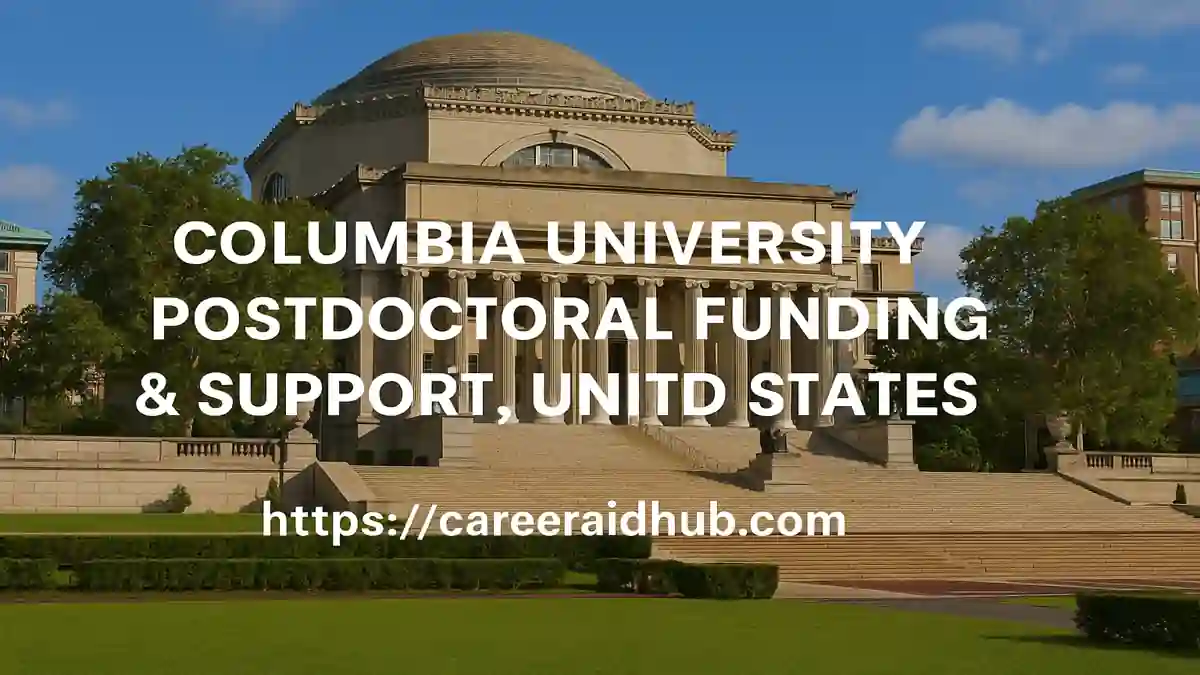Columbia University, one of the world’s most prestigious Ivy League institutions, provides extensive support structures for postdoctoral researchers through funding, mentorship, and professional development. Opportunities include internal fellowships, travel supplements, seed funding, and guidance for securing competitive external grants. Postdocs benefit from a centralized infrastructure designed to enhance research productivity and long-term career advancement.
This article explores the key mechanisms, resources, and opportunities available to postdoctoral scholars at Columbia, along with strategies for making the most of them.
Columbia University in the City of New York offers a rich ecosystem of postdoctoral funding opportunities. With robust institutional support, competitive travel grants, and mentoring programs, the university empowers early-career researchers to advance their scholarship, secure external funding, and transition toward impactful careers in academia, industry, and beyond.
Columbia’s Infrastructure for Postdoctoral Support
Office for Postdoctoral Affairs & Early Career Research (OPA/ECR)
The Office for Postdoctoral Affairs & Early Career Research (OPA/ECR) plays a pivotal role in supporting postdocs at Columbia. It functions as the first point of contact for new scholars and provides comprehensive services:
-
-
Career development programming including mentoring workshops, proposal-writing seminars, and skill-building sessions.
-
Counseling services addressing housing, insurance, and university policies.
-
Networking opportunities through orientations, social gatherings, and interdisciplinary forums.
-
Resource management with a
centralized repository of internal funding opportunities and university policies. -
Administration of Postdoctoral Travel Grants and hardship funds that assist scholars in maintaining momentum when financial obstacles arise.
-
For incoming postdoctoral scholars, engaging with OPA/ECR early ensures a smooth onboarding process and access to institutional resources.
Grants Support & Funding Tools
Columbia equips postdocs with practical tools to increase success in securing external grants:
-
-
Grant Starter Kit: Templates, checklists, and sample proposals to guide applications.
-
Workshops: Specialized training in writing NIH, NSF, and foundation grants.
-
PIVOT Database: A university-wide platform offering access to international funding opportunities.
-
Seed Funding & Limited Submissions: Managed by the research office, these provide early-stage project support and ensure equitable access to major external grants.
-
By combining training, technology, and institutional oversight, Columbia creates an environment where postdocs can compete effectively for national and international awards.
Key Funding & Grant Opportunities for Postdocs
Postdoctoral Travel Grants
The Postdoctoral Travel Grant program is a cornerstone of Columbia’s internal funding. It supports postdocs presenting at conferences or invited lectures, covering travel, lodging, and registration expenses. Applications must be submitted well in advance, as late or incomplete requests are not considered.
External Government & Foundation Funding
Columbia
-
-
US federal agencies: NIH, NSF, DoD, DOE, EPA.
-
Private foundations: American Cancer Society, Health Research Alliance, Ford Foundation.
-
Discipline-specific programs: Fellowships that focus on biomedical, engineering, humanities, or social sciences research.
-
These awards often provide multi-year support, greater autonomy in project design, and stronger recognition in the academic job market.
Departmental or Lab-Specific Support
Individual departments and laboratories also fund postdocs through PI-led grants or departmental budgets. Many advertise open positions via Columbia’s Recruitment of Academic Personnel System (RAPS).
Specialized centers, such as the Columbia Center for Injury Science & Prevention, provide structured postdoctoral fellowships that combine mentoring, training, and interdisciplinary collaboration.
The Society of Fellows in the Humanities
The Society of Fellows in the Humanities (SOF/Heyman) offers one of Columbia’s most prestigious opportunities for early-career scholars in the humanities and social sciences. Fellows receive funding, mentorship, and teaching experience, allowing them to deepen their research while engaging with the broader intellectual community at Columbia.
What Postdocs Gain by Choosing Columbia
Pursuing a postdoc at Columbia University provides multiple advantages:
-
-
Institutional support: Access to OPA/ECR services ensures continuity in research and funding.
-
Professional development: Opportunities in grant writing,
ethics training, and teaching preparation. -
Financial support: Internal seed funding and travel supplements reduce financial strain.
-
Global recognition: Columbia’s reputation strengthens candidates’ competitiveness for future academic or industry positions.
-
Collaborative environment: Interdisciplinary research groups and labs promote innovation and broaden networks.
-
These benefits collectively make Columbia a premier destination for ambitious postdoctoral scholars.
How to Apply & Engage
Step 1: Identify Departments or Labs
Start by exploring Columbia’s departmental websites to locate PIs with aligned research interests. Many fellowships are advertised through labs or centers.
Step 2: Connect with OPA/ECR
Engage with OPA/ECR for orientation schedules, mentoring programs, and travel grant cycles. Early contact ensures you are informed of all deadlines.
Step 3: Use Columbia’s Grant Tools
Utilize the Grant Starter Kit, register for proposal workshops, and search the PIVOT database regularly.
Step 4: Develop Strong Proposals
When preparing applications, ensure clarity by presenting research significance, detailed methodologies, budgets, and dissemination strategies.
Step 5: Adhere to Deadlines
Submit travel grant applications well ahead of conference dates. Late or incomplete submissions are not reviewed.
Step 6: Build a Professional Network
Attend
Challenges & Considerations
While Columbia provides a supportive environment, postdocs should remain mindful of potential challenges:
-
-
Competitive funding: Demand often outstrips supply for both internal and external grants.
-
Grant dependency: Some positions rely heavily on renewable project funding.
-
Administrative complexity: Navigating Columbia’s policies can be time-consuming.
-
Interdisciplinary challenges: Bridging diverse fields may require additional adaptability.
-
Time constraints: Balancing grant writing, publishing, and career planning requires efficient management.
-
Awareness of these issues allows postdocs to better strategize and prepare.
Sample Timeline & Key Phases
| Phase | Activities |
|---|---|
| Onboarding | Complete orientation, meet OPA staff, set up benefits |
| First 3 months | Identify collaborators, refine project goals, search for grants |
| Months 4–6 | Draft proposals, attend internal workshops |
| Months 7–12 | Submit applications, present research at conferences |
| Second year | Publish results, mentor junior scholars, expand collaborations |
| Final months | Transition planning for academic or industry roles |
Final Thoughts
Columbia University in the City of New York offers one of the most comprehensive ecosystems for postdoctoral researchers worldwide. With institutional resources, mentoring, travel grants, and external funding support, the university helps scholars thrive during this critical career stage.
For those seeking to enhance their research trajectory in an intellectually vibrant environment, Columbia represents an unparalleled choice. Prospective applicants should monitor the funding opportunities portal for the next cycle, typically announced in late summer or early fall. Applications for the following year are usually due in September, though exact dates vary and will be updated soon.
Program Snapshot
| Feature | Details |
|---|---|
| Program Name | Columbia University Postdoctoral Funding Opportunities |
| Host Country | United States (New York) |
| Funded By | Columbia University & external sponsors (NIH, NSF, foundations) |
| Duration | Typically 1–3 years, depending on fellowship or grant type |
| Study Mode | Full-time, on-campus research |
| Eligibility | Early-career researchers with a doctoral degree or equivalent |
| Financial Support | Stipends, travel grants, conference support, seed funding, external fellowships |
| Fields of Study | STEM, social sciences, humanities, interdisciplinary research |
| Deadline | Varies |
| Official Website | Columbia Research Postdoc Funding |
Frequently Asked Questions (FAQs)
Columbia provides travel grants, seed funding, hardship funds, and support for securing external fellowships from federal agencies and private foundations.
Early-career researchers with a doctoral degree or equivalent, working in STEM, social sciences, humanities, or interdisciplinary fields, are eligible for Columbia’s postdoctoral funding.
You apply through the Office for Postdoctoral Affairs. Submit a completed application, proof of conference participation, and required documents before the stated deadline.
The office offers career development workshops, counseling, grant support, networking opportunities, and funding administration for postdocs across departments and research centers.
Yes, Columbia actively supports applications to NIH, NSF, DOE, and private foundations, offering resources, workshops, and mentoring for competitive external fellowship submissions.
No, postdoctoral funding opportunities are available across sciences, engineering, humanities, social sciences, and interdisciplinary research areas at Columbia University.
Support includes stipends, travel supplements, seed funding for projects, and assistance in applying for competitive external fellowships.
Funding duration varies but generally spans one to three years, depending on the fellowship or departmental support structure.
Postdocs gain access to mentoring programs, grant-writing workshops, career planning sessions, teaching preparation, and university-wide networking events.
Columbia combines robust institutional resources, competitive funding, global reputation, and interdisciplinary research opportunities, making it an excellent environment for early-career scholars.










